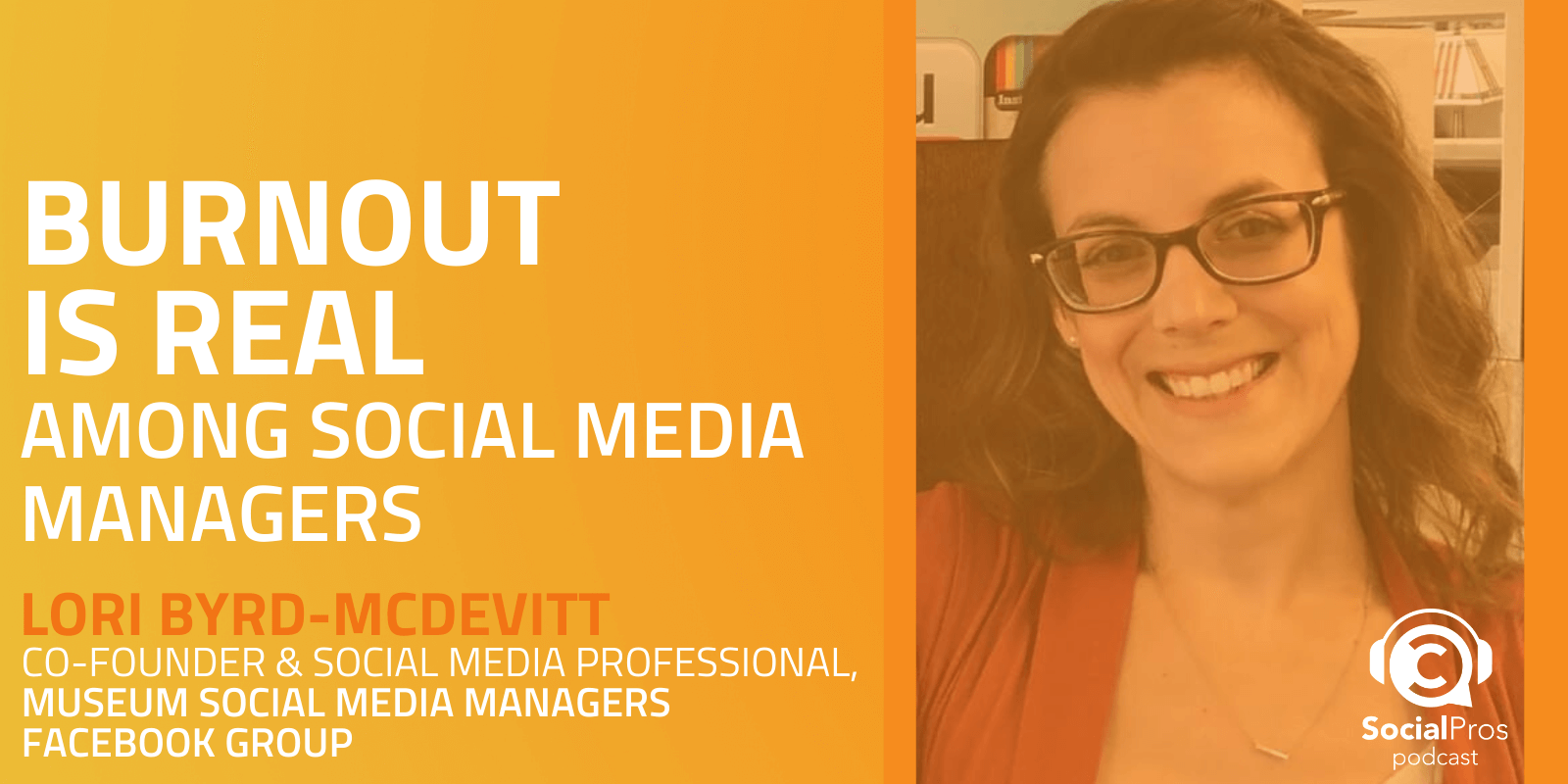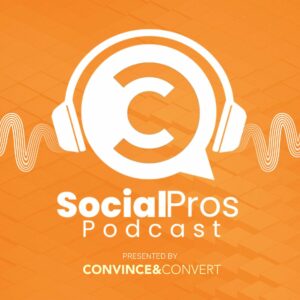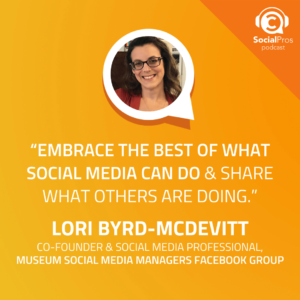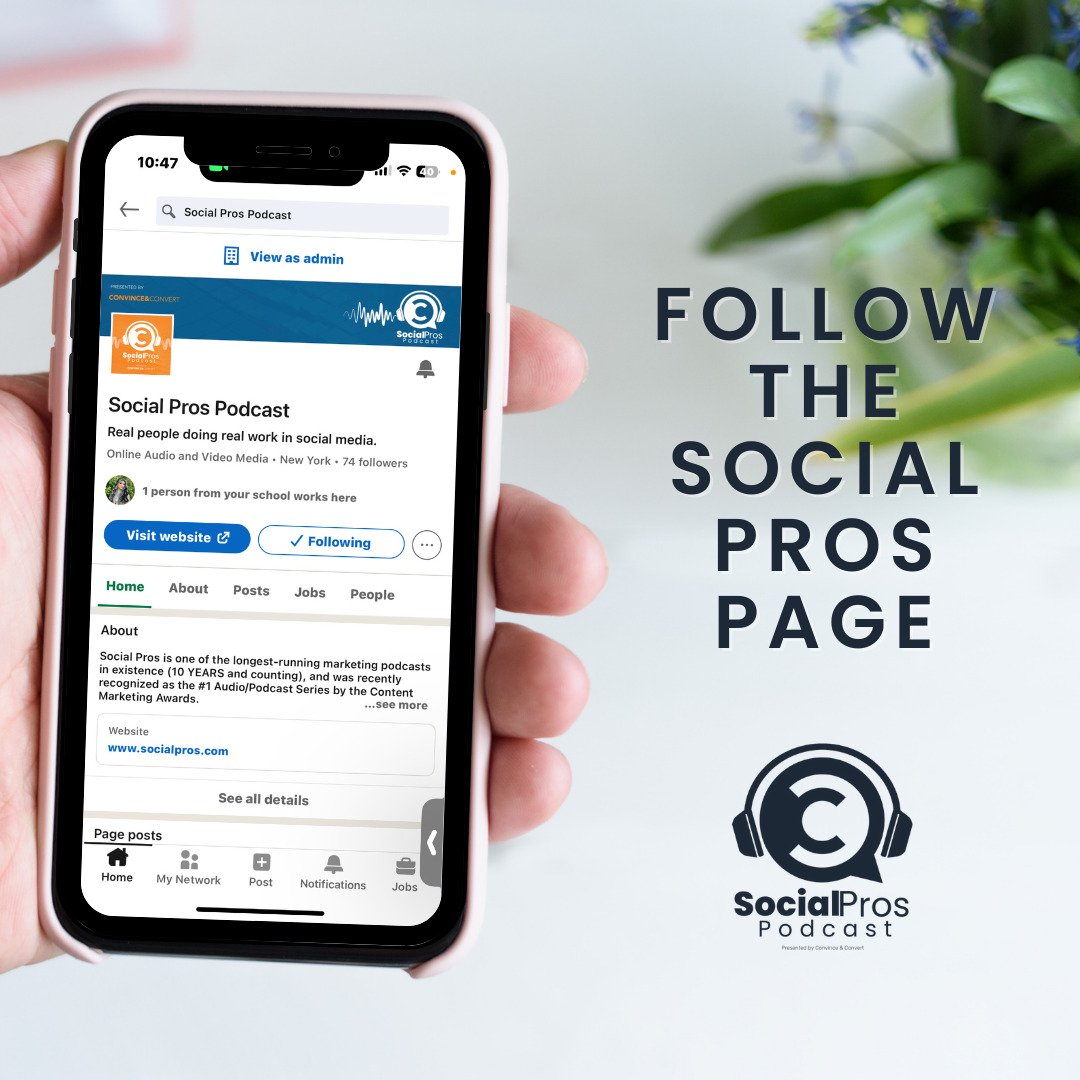Hosted By
About Social Pros Podcast:
Social Pros is one of the longest-running marketing podcasts in existence (10 YEARS and counting), and was recently recognized as the #1 Audio/Podcast Series by the Content Marketing Awards.
Our purpose? Making sure that we speak to real people doing real work in social media.
Listeners get inside stories and behind-the-scenes secrets about how teams at companies like Google, Reddit, Glossier, Zillow, Lyft, Marvel, and dozens more, staff, operate, and measure their social media programs. With 600+ episodes, the Social Pros Podcast brings the humanity of social media to the forefront, while providing incredibly useful marketing strategies that listeners can immediately implement.
Follow Social Pros on LinkedIn.
To inquire about becoming a guest or show sponsor, please email our Executive Producer, Leanna Pham, at leanna@convinceandconvert.com.
Apple Podcast Reviews:
The Social Pros podcast has quickly become a favorite in my feed! I'm consistently impressed by the engaging conversations, insightful content, and actionable ideas. I truly learn something every time I listen!
@Arlie KThis is absolutely an awesome listen for anyone in communications or social media!!
@Will31CThis podcast has become one of my staple weekly podcasts for learning about marketing! Love the conversations that they have and it's always enjoyable and educational!
@Simonstone95Love the podcast - informative, in depth and spot on for any business size.
@MissTriathlon
Social Media Professional and Co-Founder of 1909 DIGITAL, Lori Byrd-McDevitt, joins the Social Pros Podcast to discuss the reality of burnout in the social media manager community and what we can do to prevent it.
 You Can’t Unburn Burnt Toast
You Can’t Unburn Burnt Toast
The life of a social media manager can be demanding to say the least. The role entails more than simply updating the company’s social media channels. And, around the clock monitoring paired with a growing list of responsibilities stirs up the perfect recipe for burnout.
Despite all of this, a lot of people (even the ‘higher-ups’ in a business) tend to disregard and overlook the Herculean effort that social media managers perform on a daily basis. The unspoken truth is that social media practitioners have to constantly prove themselves and their strategies. Everything they do is under constant scrutiny and the tremendous pressure is enough to trigger burnout.
Social Media Professional and Co-Founder of 1909 DIGITAL, Lori Byrd-McDevitt, isn’t afraid to talk about burnout in the social media managers community. Not just that, but she helps thousands of social media professionals focus on self-care and preventing burnout before it strikes through her Museum Social Media Managers Facebook Group. As Lori pointed out, “You can’t unburn burnt toast.” In other words, we need to work together to prevent burnout, which is quickly becoming a wider social media manager problem.
In This Episode:
- 05:04 – How social media for museums differs from other companies
- 08:50 – How museum executives tend to view the role of social media
- 11:05 – How the Museum Social Media Managers Facebook Group evolved over time
- 14:02 – How to balance and integrate various goals into a social media program
- 16:37 – The reality of burnout in the social media manager community
- 23:35 – Self-care tips to help you avoid burnout
- 32:11 – Useful tips around Facebook group administration
Quotes From This Episode:
“You can’t unburn burnt toast. Once you’re burnt out, you’re done. So, what we need to do is work together to prevent it.” – @LoriLeeByrd
Social media managers are on the front lines…it's not much different than being at war. Click To Tweet
Resources:
- Get the new State of Marketing report for free from Salesforce
- Find out more about the community at SocialMedia.org with a special form for Social Pros listeners
- Read Salesforce’s FREE e-book – 50 Social Media Best Practices
- Discover how Emma can help you reach your email marketing goals
- Read Ella Dawson’s article – There Is No Cure For Burnout
- Learn more about Dr. Zubin Damania’s views on burnout in the healthcare industry – It’s Not Burnout, It’s Moral Injury
- Check out Lori’s Museum Social Media Managers Facebook Group
- Find out how 1909 DIGITAL can help you build an authentic marketing plan
- Read, ‘Objective Lessons: Self Care for Museum Professions‘
Lori Byrd-McDevitt
What’s your one tip for becoming a social pro?
Stand on the shoulders of giants. Celebrate another’s success and let them inspire you, rather than bitter you. Embrace the best of what social media can do and share what others are doing. The secret sauce of growing your network is to collaborate and support others.
If you could do a Skype call with any living person, who would it be?
Simon Cowell is at the top of Lori’s list. As a huge reality TV junkie, she would love to talk to Simon about his role as the ‘genius industry Grinch,’ whose heart has grown three sizes since his early days in the business. To Lori, Simon Cowell’s growth is a reflection of internet culture where once it was ‘cool’ to be snarky…now, it’s cool to be kind.
Episode Transcript
You can’t un-burn burnt toast because once you’re burnt out, you’re burnt out. It’s pretty much you’re just kind of done. So really, what we need to do is work together to prevent it. And so this clearly, obviously isn’t just museum social media manager problem. It’s a wider social media manager problem.
Well, Adam, that’s certainly true. You can’t un-burn toast. And you can’t un-scramble an omelet. All of that is true. What a different kind of-
Always breakfast foods too, by the way. Have you noticed that?
Yeah. It’s a breakfast themed show. This is a different kind of show this week on the Social Pros Podcast. We talk with Lori Byrd McDevitt, who used to be the social media manager for almost a decade at The Children’s Museum of Indianapolis. And she leads a giant Facebook group of museum social media managers. And she’s working a lot now on this idea of burnout in the social media managers community and self care, and just not stressing yourself out to the degree that you’re like, “Enough. I’ve got to get out of the social media industry.” And it is a real danger. You work with a lot of social media managers as part of your job at Salesforce. This is a real issue, and I’m so glad we’re able to spend some time with Lori in this week’s episode and bring it to the forefront.
Lori gives us, I think, Jay, such a great perspective on this. This is almost like three shows in one. We have the great opportunity of Lori to talk to us about doing social for an NGO or a nonprofit like a museum. We have her talking about being the steward of a Facebook group of 4000 members. And then as you said, this really important messaging around burnout, that we as social media practitioners, and quite frankly, people in a lot of industries are dealing with. And how we see some of the social platforms acknowledging this and recognizing this, and the challenges of feeding the content funnel each and every day. But there’s so much too still to be learned and discussed about this. And Lori really gives us an interesting vantage point.
Yeah. If you’ve ever gone home at the end of the day and thought, “Boy, I really bit off a lot more than I wanted to chew here in this social media job,” this is going to be the episode for you as Lori Byrd McDevitt joins us this week on the Social Pros Podcast. Returning this week to the Social Pros Podcast, our fantastic sponsors, including Salesforce Marketing Cloud, who have a terrific eBook called 50 Social Media Best Practices. You can get it right now. It won’t cost you a thing. They’re going to give it to you absolutely for free because you listen to Social Pros. You can get it at bit.ly/tips50social. I’ll give that to you a little bit more slowly. Bit.ly/tips50social. You should download that. It’s good. Adam helped put it together. Terrific piece of work.
Also, this week’s show brought to you by our friends at Emma, email service provider down there in Nashville, Tennessee. They do all the things that you want from an email service provider. They send email, people get the email. Stats, analysis, marketing automation, landing pages, list splitting, all the tactical stuff that you want to do to make sure your email is optimized for success. But what I really like most about Emma is that you can actually talk to a living human being, which sounds self evident. But boy, I’ll tell you what, there’s a lot of companies out there who are in the software business, and you want to actually talk to somebody, it ain’t going to work.
Try to get someone from Amazon on the phone for example. That’s not going to happen. Emma’s great crew, really terrific group of people, they’d be happy to help you. Go to myemma.com/jayisawesome to learn more. That’s myemma.com/jayisawesome, all lowercase, to find out how they can help you or the email person in your organization. Let’s talk this week to Lori Byrd McDevitt all about Facebook groups, burned out in social media, and best practices for museum social media managers. It is, as Adam said, three, three, three, three shows in one here on the Social Pros Podcast. Lori Byrd McDevitt, welcome to Social Pros. Thanks for being here.
Thanks for having me.
We are psyched to have you. Your experience is so interesting because you have been on the museum side of social media. You, in addition to being the co-founder of the digital services social media consultancy, 1909 Digital, located in Indianapolis, not too far from where I sit right now, you were also the head of social media for the Indianapolis Children’s Museum, which is the largest children’s museum on the planet, or something like that.
Yes.
And what I find super amazing is that you are the co-founder of the Facebook group for museum social media managers. And you may think, “Geez. Why is there a Facebook group for that?” But there’s thousands of people in-
4000.
In the Facebook group, yeah. And actually, your co-founder I think was Ryan Dodge, who was a guest on the Social Pros Podcast at one point, when he used to be at the Royal Ontario Museum up there in Toronto, Canada. So thank you so much for being here. We really appreciate you taking the time.
Thanks so much.
Tell us a little bit about the museum social media world and how it differs from what some of our listeners, who might work more on the company side of social. What are the comparisons and contrasts there?
I mean, if you really think about it, museum social media managers have really weird jobs. So you take the craziness of your typical social media manager and you add in lots of quirky collections, objects, very opinionated visitors, possibly climbing on those objects, and the possibility of controversy that’s tied to your museum could be erupting at any moment. I mean, I could go into a really quick day in the life of a museum social media manager.
Please. I can’t wait. Yes, please.
I mean, so if you think about it, because their collections are often so vast, we could tie to almost any trending topic or holiday you can think of, so that’s an embarrassment of riches. But on the other side, there’s this flood of programs, exhibits and competing internal promotional content that they’re having to manage every day. So they’re not able to be really deliberate in a campaign or a content plan. It’s a constant struggle to keep your head above water in that way. And then on the other side, museums, a lot of them are what you think they would be with being a little bit behind the times with a lot of their staff. So they’re slow to understand a lot of social media best practices or simply dismiss the job as if anyone can do it. It’s really hard to get them up to speed in that way.
The C-suite still is thinking of social media managers, generally speaking, as lesser than or giving them fewer resources, and that’s really frustrating. And similarly to any social media manager, they are the front line digital customer service. On top of everything else, they’re still doing 24/7 monitoring, but museums often are major tourist attractions, so there’s endless comments, questions, reviews. At one conference that I went to, a friend from the major DC museum described tracking visitor Instagram stories as, I can only qualify that with overwhelm. Right? There’s just so much to keep track of with such little time.
And then of course, there’s the expectation to be human. Think about museums and how diverse and unique they are, and the very specific tones that you can have as a museum and putting your humanness into that. So there’s that level of vulnerability there. And my friend, Russell Dornan, he is now at the VNA Dundee. He had been at the Welcome Collection, and had really built up their accounts and established their cheeky, risky tone. I really encourage you to look up the Welcome Collections accounts. And he said, “Putting your heart on line, or on the line, leaves it exposed. And so every cruel jibe aimed at your organization really cuts you like a knife.” And so that’s what easily leads to burnout. So don’t even get me started on crises communications and controversies like that because that could be a whole other episode. I’ll come back to that one.
Nobody wants to hear that their baby is ugly, even if they know their baby is ugly. And in your case, because you work for a museum, which is a children’s museum, you have the added sort of wrinkle of many of the patrons being children. Right? And content being created by minors, and you’ve got children’s online privacy protection act regulations, and a number of other kind of circumstances that even other people in the museum social media business wouldn’t have to contend with, or at least not at the same level.
Sure.
It is interesting what you said about executives in museums not fully understanding either the role of social, and/or the benefit of social. Do you think that they continue to spend money on visitor attraction in what we might consider to be yesterday’s tactics? Or do they just feel like social media isn’t really that important, or it’s not that hard? We could get anybody to do it.
There’s definitely, it’s a little bit of both. There’s definitely the intern mentality a little bit still. I’m speaking in generalizations. There’s definitely a lot of great museum CEOs that are making strides. But generally with museums, we like to say it’s like turning the Titanic around. It’s just a big entrenched sort of thinking. So yeah, it is very much focused on doing the almost … In some ways, trying to remain relevant is a big question. So it is focusing on the entertainment aspect in some ways, depending on what type of museum it is. And there’s that balance there of what’s going to drive visitors in. And it’s trying to build an understanding of how social media plays into that. And so social media managers in museums specifically are always trying to make the point that we are that first touchpoint digitally out there to your customers, to your visitors. So give us those resources to be the brand and bring people in.
And increasingly, if you don’t get that first touchpoint right, you’re not going to get the second touchpoint.
Exactly.
I mean, that’s the point that I think people don’t quite understand. You get sort of one chance to make a first impression. And that first impression is now handled via Google, or Facebook, or Instagram. Right? It’s not the, well, they bought a ticket, and that’s the first impression. No, bro, that’s like the seventh impression. It’s that whole zero moment of truth premise. That being said, even with those limitations and challenges with resources and support, psychologically, emotionally, some of the greatest social media campaigns in history have come from museums and museum social media practitioners. There’s the sort of, against all odds, we’re going to do amazing things. And you have seen so many of those and chronicled them and celebrated them inside the mus social community. Talk a little bit about the community and its strength and its power, how it was created and how its evolved over time.
Yeah. So as you mentioned, Ryan Dodge, formerly from the Royal Ontario Museum, he is one of my dear friends. And back around 2013 I would say, feels so long ago, we just realized we were kind of tired of us being frustrated with being in competition with one another. And we realized we wanted to be supportive of one another, so we created this Facebook group, Museum Social Media Managers. And it has just grown and grown really fast. As you mentioned, it’s over 4000 people now. And we vent a lot to one another. We share resources, and we collaborate, as you mentioned. And so one of my favorite examples of a collaborative project is back when alternative facts were an issue a couple of years ago. And just a couple of the social media managers in the group said, “We as museums need to stand up and do something.”
And so they came up with the hashtag day of facts. And on one day, museums across the United States all simply stated facts on Twitter. And it got national attention in major newspapers, Washington Post and things like that. And it really did make an impact. And when you really think about it, when all of the nations, or even sometimes the world’s social media managers and museums decide to do a thing, people are going to listen. And so that is what really makes me proud of this group, that we can pull together in that way in addition to just supporting one another when we otherwise aren’t supported in our museums.
When I saw the hashtag, if you don’t capitalize it, it looks like day off acts, which is a different thing entirely. The things you do on your day off is not the same as day of facts. But now I piece it together now. I’m like, “Oh, yeah,” so that makes more sense.
We’re professionals. We capitalize our hashtags.
Exactly. All the museum people, they use correct punctuation in all of their hashtags. Adam, go ahead.
Lori, it’s so [inaudible 00:13:41] too. And that’s one of the things I like about that program, that here we are as social media professionals using social media to bring people together, not necessarily about our organization or our product. That was one of the things that I truly appreciated on the success that you had with the day of facts initiative. One of the things that I think interests me about your space is the fact that, number one, most social media professionals in the museum space have multiple hats they’re having to wear. And you articulated that very well. The other things is primarily everyone would think from the outside that the social media manager of a museum is there to draw visitors and to draw ticket sales and things like that. But just as important in many instances is around development or fundraising. And that’s a huge part of the museum kind of model. And I’m curious how social media managers reconcile with that other side, which is: How do we get people who can give donations and be contributors to the museum? And how all that fits into the social media program.
Yeah. We do have to be very careful about how we balance all of those different factors and the different goals in social media, and also having that authentic voice. So really, it’s taking the goals of all of the different departments around the museum. And development and fundraising is just one of the many goals that social media managers are always contending with. It’s not necessarily the social media manager making those decisions about the messaging even, or what the campaigns are. They might have a say in it, but it’s really that mix of what is going out. But we always want to have that layer of authenticity on there, and have just that human aspect to it. So of course, there’s crowd funding. Of course, there’s Giving Tuesday, which museums take a major part in. And we’ve realized that the field is flooded on that day, so it’s not very successful.
Interesting.
So we come together around that, and actually, the 4000 of us decide. Is this actually a viable day for us? That’s one of those things that we can talk about together. But yeah, it’s all just part of the mix of the promotions, the trending topics, what’s going to be relevant for the audience. And sometimes they don’t want to be asked for money through Twitter, so we have to make that argument back to our development teams.
You mentioned this group of 4000 members. And having any sort of organization of your peers I think is so critical. And I think when you look at that, and you also look at the other thing that you brought up of burnout, of the challenges that we have as social media practitioners, and people understanding what we do, maybe it be our managers, it may be our leadership and the challenges of that. Do you find that that membership roster and group is good for [inaudible 00:17:08], or there some more other different types of therapeutic benefits that come from being associated with like minded people who have challenges? And are you creating any kind of new programs to help them kind of feel the uniqueness of their position and that they’re not unique in the burnout?
Yeah. It’s been really interesting to see the conversation ebb and flow around self care and burnout lately. And that’s really what I’ve been on a little bit of a mission to bring to light more recently, is the misuse of the term burnout, actually, that really people keep putting the impetus on the employee to solve the problem. And so that’s why we’re going to groups like Facebook groups to have that support system. But really, what I’m finding as I’m looking out into the broader writings of other people is that putting it on the employee is really more victim shaming, actually. It really needs to be put back on the employer to be proactive in their approach to helping find that space for social media managers to have their wellbeing thought about.
And so I found this recent article in looking outside of the museum social media manager sphere from a writer and a social media pro, Ella Dawson, that just hit recently. And it really resonated with me. And this metaphor she said was, you can’t un-burn burnt toast because once you’re burnt out, you’re burnt out. It’s pretty much you’re just kind of done. So really, what we need to do is work together to prevent it. And so this clearly, obviously isn’t just a museum social media manager problem. It’s a wider social media manager problem. And in fact, even further out than that, there’s Dr. Zubin Damania talks about it being moral injury in the healthcare profession.
So if you think about us saying that social media managers are on the front lines, it’s not much different than being at war. Thinking about the PTSD of coming back at war, and you want to go and have this moral understanding of what you know is right, but you have to deal with the worst of the worst. And social media managers often have to do that too. You go out every day, 24/7, and you have to deal with the trolls of the internet, the worst of the internet, and put on the happy face. And you never get to let up. So I feel like there’s a lot of parallels there. Obviously, we’re not going to war. I don’t want to try to equate that. But there’s just a lot to be learned from some of these different phrases and what these different fields are talking about. It’s clearly not our niche. It’s not even just social media managers. It’s nurses dealing with burnout. It’s a lot of other fields dealing with this.
My friend, Seema Rao, she wrote a book literally called Self Care for Museum Workers, so we’re already trying to solve the problem, so that’s great. Right? One of her points she makes is that we don’t have to wait. It should be that the whole structure changes. That’s what really needs to happen eventually. But in the meantime, it really just falls to the managers advocating for their employees, for colleagues advocating for social media managers, and really, managers helping make the time for their employees to have that self care time, and not being afraid to talk about burnout themselves.
Sharing challenges isn’t a sign of weakness. And by talking about it more, it removes the stigma around it. And so I think that’s really important that we’re all talk about. Even when I first recently shared a blog post about this, I had people just come out of the woodwork in droves. I was really shocked because I just was kind of venting, but it really resonated. I had a colleague from the Dallas Museum of Art, who said that my blog just flew around his department that day. And it was the first day in forever that their whole team went home at 5:00 PM. And then he noticed a true change in how his whole team treated their social media manager, and really respected her more after that. And that really impacted me the most. So I think that really, it’s just about understanding and talking about it is really that first step.
We’ll make sure to link up some of the resources that Lori mentioned at socialpros.com, so you can go and dig a little deeper and learn more about these issues. And I would argue that just organizationally, one of the challenges is that in most museums, there is a social media manager. And it is a department of one. It’s not like there’s a whole bunch of people, and if you’re out sick, or you want to take a little time, someone can cover for you. Obviously, your results may vary based on the size of your museum and your budget. But typically, in my experience, there is a person. Right? And so you are doing all things. Right? You’re every single conceivable job, and so that is really hard. And the relentlessness of that is definitely a part of the burnout that Lori mentioned.
And that’s why Facebook groups like the one you’ve created, the museum social media managers, are so important because in an enterprise setting, some of the clients that Adam works with at Salesforce and some of the clients that we work with at Convince and Convert, there may be two, four, six, eight, 20, 25 social media managers, or whatever the circumstances are. And some of them may be devoted to different channels or different regions. But you’ve got a posse. Right? And working every day in an organization where you’ve got no posse, and where you’ve got this sneaking suspicion that your boss neither understands nor cares about what you do is not necessarily the recipe for coming home every night and feeling that your work has purpose and meaning. So some of it is just a structural challenge with museums and just how they staff social media.
Right.
Because of this movement around self care and the now very, very large Facebook group that has taken up some of these challenges and questions, do you have specific tips for Social Pros listeners, many of whom are of course social media managers in museums or otherwise? Do you have specific self care tips that you would say, “You know what, to help you avoid getting burnt out in your social media career, here are some things that had you thought this through earlier, you would’ve made sure to have done years ago when you were just kind of getting started in this”?
I would definitely say that in keeping in line with the argument about putting the impetus on your employer rather than yourself, that having a conversation about your needs upfront is really important. I know that when I had the opportunity to start a new role as a social media manager, I had a very frank conversation with my boss first thing, and said, “I have co-custody with my son. These are the weeks that he’s at my home. This is when I’m not monitoring.” And we really talked that through, just for an example. I think that’s really important, again, just taking the stigma away and talking about the challenges, and making sure that they will advocate for you. And using this conversation that’s happening right now, using resources like this, like with articles like Ella’s, to share around and say, “Look, this is a conversation that’s happening, and I would like your support.”
And then once you have that foundation, it’s not to say that you shouldn’t also provide self care for yourself. So I know that there’s different things for everyone. I’ve been reading a lot of books myself lately. And I swear to goodness, everyone says to meditate. I really have been trying to more. It’s really hard when you have small kids and a busy life. But I actually am really trying myself, breathing a lot, even just breathing helps, I’ve learned. But yeah, just taking that time to think positively, put positive energy out into the world, and positivity will come back around to you. I really do feel that that’s really true. And I know that other people have lots of different ways that they do try to unplug. And that just has to be whatever works for you. But I have not found the secret sauce for myself with that yet.
It’s so crazy hard. Right? When the whole reason you have the job is because you’re so good at staying plugged in. And then ironically, the way to make sure you don’t get sick and tired of the job and actually do real harm to yourself is to unplug. For a lot of social media managers saying, “You should unplug so you can chill out,” that’s like saying, “You should stop breathing air.” Right? It is very, very difficult to do. I find myself struggling with it.
Thank you, Jay.
And Adam [inaudible 00:26:26] manager in the classic sense. Right? It’s just really, really hard. Adam, we should do a show on meditation, literally how to do meditation for social media professionals. We should totally make that happen. It’d be great.
No, I love that. It’s tangentially related to that, Lori, is the company I work for, Salesforce, is … And Marc Benioff, our co CEO and founder, meditation is a big part of his passion and enthusiasm. It’s something that he’s tried to bring to our organization as well, so I can’t agree more.
That’s great.
Lori, you have a really interesting vantage point in all this. And what you’re sharing with us resonates so much. I know you and Ryan were selected to be part of Facebook’s first Facebook community summit to represent your group of museum social media professionals. I think we’ve recently heard in the news how other social platforms are looking at the relationship with their content creators, YouTube really trying to help fix and respond to burnout for video content creators on their platform. I’m curious if you’re seeing any more actions or activities from the social media platforms themselves to either A, acknowledge kind of what we’re talking about here. And B, are they doing anything about it?
Yeah. I really have not necessarily seen any actions from other platforms really talking about this. I feel like it’s really been a grass roots effort from social media professionals themselves. If they are, I’d love to see it. I just really have been interested in the dark social aspect of it, and online communities themselves as that way to organize and find those opportunities to support one another.
Kind of going back to your organization, you’re co-founder now of 1909 Digital. And as you grow this group and practice, one of the things you shared with us before was your use of LinkedIn as kind of being, as you as the organization have kind of grown up, it’s becoming more and more of an interesting platform for you to use for 1909 Digital. This is something that we’re hearing on the show quite a bit. We had a content and a community manager and strategist from LinkedIn, Amber, on just a few weeks ago. She’s seen it kind of from her vantage point. Curious kind of how you’re seeing your use of LinkedIn mature, and if you think it’s a valuable resource, and if you’re doing anything different on LinkedIn that you may have been doing on one of the more kind of, we’ll call older school traditional platforms.
Yeah. It really is interesting to see LinkedIn shift. I would say a few years ago, it was the only platform my business focused father was on. And now it’s actually one of the platforms that I find myself looking at all of the time, and really being inspired by the content that is on there on the streams being shared by I feel like a lot of business developers, a lot of even C-suite or director levels, mid career professionals, really, I feel like being transparent about their challenges and being really positive. I see it as being a very positive platform now, which is what really resonates with me. And so yeah, I find myself on it a lot. And I feel like as social media managers have a little bit, I could say, grown up throughout the past decade, it’s an opportunity to share our needs on that platform more so, and be able to make the case to those C-suite.
I want to ask you one quick question on that because I’m seeing the exact same thing. And I’m finding myself going to LinkedIn because of that. And the only thing I can put my finger on, Lori, unless this is an amazing algorithm shift that they’re making, is there seems to be less political vitriol on LinkedIn. It hasn’t permeated LinkedIn like we see on Twitter, like we see on Facebook and the others. I’m curious, just from a purely personal standpoint. Does that have any impact on you like it’s having on me personally?
Yeah. That is very true. I do not … I feel like people model behavior, even if it’s subconsciously. So you tend to share what you see other people sharing. So I do wonder if the algorithm is prompting other people to continue sharing what they’re seeing. This is the norm here. I’m going to continue sharing this sort of content. And I’ve noticed in whether it’s an emerging museum professionals group, or with my students that are emerging museum professionals, or in other Facebook groups like Museum Social Media Managers, people asking, “Is it appropriate to post this on LinkedIn?” So people are more wary of what they post on LinkedIn. They’re anxious about how it will be perceived, so I think that it’s one of those places where you curate your content more. And so you might be more hesitant to post political views there as well.
That makes a lot of sense. You typically don’t have the same kind of cadence pressure either. You’re not trying to post multiple times a day to LinkedIn, typically, so you can be a little bit more thoughtful about what you put there. Lori, I wanted to ask you about the Facebook group. It’s so successful. Right? And it’s a very thriving community in every sense of the word. What tips do you have for Social Pros listeners, who are either maybe in a Facebook group, or admins of a Facebook group, or want to start a Facebook group, either amongst their colleagues and peers, or even for their customers? What tips do you have about Facebook group administration and creating that kind of thriving culture there?
Thanks for asking this question. I love online communities so much. And I really had a great time having the chance to go up to the Facebook community summit and getting to learn from Facebook and from other Facebook group admins. It really is amazing to get to learn from these other people, and just see what sort of actual strategies and tactics they’re doing. And really, it’s about, again, I mentioned earlier modeling behavior, encouraging those who have shared positive or encouraging content that you want to see. And in those early years in the group, it’s kind of natural for me, I always want to be the cheerleader for people. I always like to encourage successes. And I would always, whenever someone would post something, I would never let a post go un-liked, or un-commented on. I would always encourage them, so it wouldn’t be just me posting content.
We also have a … Oh, how do you say it? It’s just a thing we do every week where you’re able to sign up for our cover photo. And because we couldn’t agree on what our cover photo should be because we’re all the museums of all over the world. Right? So what on earth should that be? We’re all beautiful institutions. So there’s a document where you sign up and you also in that document post your photo for the cover photo. And every Monday, I update the cover photo. Recently, at a conference, I had a friend say, “It’s just so comforting knowing that every Monday when I get a notification from the Museum Social Media Mangers group, it’s just Lori updating the cover photo.”
I love it. It’s like a Google doodle.
It’s Google images of the day. Yeah.
I’ve never thought of it like that. We’re at 246. I just updated it today, so we’ve featured 246 museums, which is pretty amazing to be able to see these photos from all over the world. So that’s one thing that we’ve done. And yeah, it’s just being able to empower others to be able to share and reminding them. Please do brag about your successes, we love a good humble brag. Just making sure people feel comfortable. Of course, it will depend on what your group is, but I think that it’s just establishing those norms early on and getting that community feeling comfortable to contribute is really the trick.
Yeah. That’s great advice. I love that. I like having the ritualistic approach to the same way that we talk to so much on this program about not doing random acts of social, and actually having shows and episodic content formats. I think the same is true for social communities, if not more so. I wrote about this I think all the way back in the now revolution, this principle that you’ve got to give your fans assignments. You can’t just collect them like baseball cards. You’ve got to give them something to do. Otherwise, why are they a member? But you’re seeing a lot of membership organizations actually in the real world have trouble with participation for the same reason. It’s like they think that just having a membership card is enough to psychologically satisfy people. And when you’re holding the phone all the time, and you can scroll through 6000 Instagram photos in 20 minutes, you got to give people a little more bite of the apple than that.
I want to do the cover photo.
Can’t we have the cover photo of Adam and Lori and me and the Social Pros logo?
Well, I might actually because I’m sharing about our group. And I’m going to be very enthusiastic about sharing this content.
See? There you go. It’s the museum of Adam, which is a very specific collection.
I don’t think I’m going to be featured in any museum unless it’s the-
The Museum of Social Pros Podcast co-hosts, which actually has a number of people in. There’s several, there’s five exhibits now. Although, I think now mathematically are the longest running co-hosts.
Does that mean I get a wing instead of just [crosstalk 00:36:44].
You get your own wing.
Lovely.
Absolutely. Yes. You get your face on the tickets. Lori, we’re going to ask you the two questions that we ask everybody here on the program. First question. What one tip would you give somebody who’s looking to become a social pro?
I always say stand on the shoulders of giants. Celebrate in others’ successes and let them inspire you, rather than embitter you. Embrace the best of what social media can do, and share with others are doing. And I always say that this is the secret sauce to growing your network. It’s about collaborating and supporting, not trying to one up each other.
Boy, that is such good advice.
One of the most thoughtful of the answers, Jay, we’ve heard in a very, very long time.
It’s well done. I mean, look, the best way to get the spotlight to shine on you is to shine the spotlight on everybody else. And eventually, it will leak back on you. That’s just the way it works. But most people don’t have the patience for that. And most people frankly don’t care enough about other people to do that. But trust me, I will tell you that it works. Lori, if you could do a video call with any living person, who would it be?
I’m really curious if anyone has said this.
You’re like a Wikipedia genius. What we need is somebody to actually collate the 400 answers we have for this question because we’ve got a half assed Google doc, and it’s not really working. So I know you’re the right person for the job. So I probably won’t even tell you if it’s somebody who said this.
We need some museum researchers. That’s what we need.
So my person is Simon Cowell, which you might not have guessed. But I am a bit of a reality TV junkie when I’m not in museums. So I’ve watched every American Idol since the beginning, X Factor, and a number of years of America’s Got Talent. And if you haven’t been paying attention, you may think that he’s still this trite, mean Simon Cowell from the early Idol years. But really, he’s quite the opposite now. You might be surprised to know. He’s beloved, really, by people. He’s this genius industry Grinch, whose heart grew three sizes. And the old Simon has sort of melted away. And to me, it’s also a reflection of internet culture. I think it used to be cool to be snarky. And now it’s cool to be kind.
Well said. And what a great book that would be. Right? The metamorphosis of Simon Cowell. It would also be a great Broadway play. That’s what you can be doing right now. You can be working on the Simon Cowell metamorphosis butterfly cocoon story.
There you go. That could also be a museum exhibit.
Yes.
Physically, he’s lost a tremendous amount of weight. He’s changed his diet completely.
I think he was mean because he was all fat.
There’s a visual side to this as well.
Fat and mean.
Did you know he does not actually use social media or a smartphone at all? Fun fact.
He eschews social media.
Wow. I mean, I can kind of see staying off social. But no smart phone.
I’m sure some of his handlers have plenty of phones in the respective pockets.
He has people, for sure. Lori, thank you so much for taking time to be on the show. Thank you for the great work that you’re doing on behalf of the museum social managers out there. Congratulations on the new company as well, 1909 Digital in Indianapolis. And thank you for the work that you’re doing calling attention to the plight of social media managers, not just in the museum space, but in all spaces. I think if you listen to this program, you probably well know, perhaps all too well, just how hard of a job it is. And it’s underappreciated and under recognized, so thanks for the work that you’re doing.
Thank you, Jay.
Friends, don’t forget. All of the episodes that we’ve ever done, a lot of them with Adam even, you can find at socialpros.com. We’ll link up a lot of the resources that Lori mentioned in today’s episode. We’ve got transcripts. We have the audio. We’ve got show notes, all that stuff at socialpros.com. Thanks as always for listening. We really appreciate each and every one of you. On behalf of Adam from Salesforce Marketing Cloud, I am Jay, founder of Convince and Convert. This has been hopefully your favorite podcast in the whole world. Keep on making it happen out there. Hug each other. It’s going to be okay. This has been social pros.








